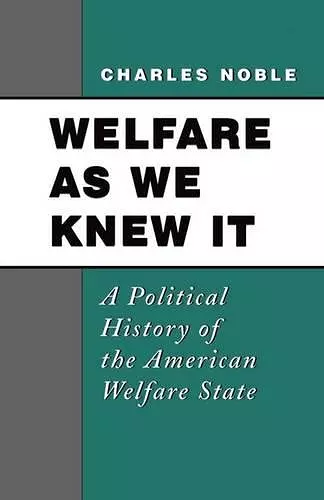Welfare as We Knew It
A Political History of the American Welfare State
Format:Paperback
Publisher:Oxford University Press Inc
Published:11th Sep '97
Currently unavailable, and unfortunately no date known when it will be back

Compared to other rich Western democracies, the U.S. does less to help its citizens adapt to the uncertainties of life in a market economy. In Welfare As We Knew It, Charles Noble offers a groundbreaking explanation of why America is so different. Drawing on research in comparative politics, history, and sociology, he demonstrates that deeply-rooted political factors, not public opinion, have limited what reformers have been able to accomplish. Rich historical analysis covering the Wilson administration to the present is followed by a provocative look at future U. S. social policy. Reformers who want government to do more, Noble argues, must refocus their activities on political and institutional change, such as campaign finance and labor-law reform, if they hope to succeed. Taut, comprehensive, and accessible, with a much-needed international perspective, this book will change the way we look at U. S. social policy.
"This most worthy addition to the welfare literature explains why the US has had such a narrow and controversial welfare state....This clearly written. accessible book will see wide use both in courses on policy making and political institutions and in courses on welfare policy."--Choice
"This is one of the first, and will likely remain one of the best, efforts to come to terms with the demise of "welfare as we knew it" in the United States....This book will give its readers no comfort. But it should enable them to see much more clearly how the structure of the American state and economy sets the limits and opportunities for aid to the poor and decency across all levels of American society."--Jennifer Hochschild, Princeton University
"A sober but brilliant interpretation of American welfare state politics. In an uncommonly balanced analysis, Noble shows the roots of recent developments in fundamental features of American political history, and in the institutional arrangements that history has bequeathed to us. A major contribution."--Frances Fox Piven, City University of New York
"A terrific piece of work. Exceptionally well-written and drawing upon an enormous range of literature, Noble's book brilliantly clarifies the current debate over welfare and the extent and form of the welfare state in America. Looking at topics such as race, labor unions, the politics of business, the impact of welfare programs, the implications of federalism and divided government, and more, Noble demonstrates that the American welfare state is not a failed, or flawed, or incomplete welfare state compared to others in the world, but one built upon an entirely different logic, grounded in American institutional, economic, and social structural arrangements."--Edward S. Greenberg, University of Colorado, Boulder
"An immensely knowledgeable book, rich in historical and theoretical insights, and written with exceptional clarity and verve. Its use of social scientific and historical analysis to locate the American welfare state in comparative context makes the book the rarest of finds--an original scholarly work, high on method and readability, and ideal for the classroom. It is a remarkably timely and significant contribution that helps us come to terms with what we lost and conceive sensible and well-informed alternatives."--Joel Krieger, Wellesley College
"Comprehensive and compelling...Drawing on a large comparative literature and a wealth of historical material, Noble argues that the relatively stark underdevelopment of the American welfare state stems in large part from our basic political institutions. Against a backdrop of racial and ethnic divisions, turn-of-the-century progressives, New Deal reformers, trade unions, and poor people's advocates were all significantly constrained in building winning coalitions, pursuing radical political strategies, and, ultimately, constructing an ample network of public social protection by America's decentralized policy-making institutions, fragmented party system, and inhospitable electoral laws....Must reading for students and scholars of social welfare policy."--Duane Swank, Marquette University
"The book we have been waiting for--an accessible and superbly proportioned analysis of the political, economic, and social factors that have both propelled and constrained the development of the American welfare state."--Joel Blau, Dept. of Social Work, SUNY Stony Brook
"For activists or city planners interested in the rights and needs of the poor and disenfranchised, such a close examination of the pattern of political choice is illuminating."--APA Journal
- Winner of Named a 1998 Outstanding Academic Book by ^IChoice^R.
ISBN: 9780195113372
Dimensions: 156mm x 233mm x 17mm
Weight: 354g
224 pages